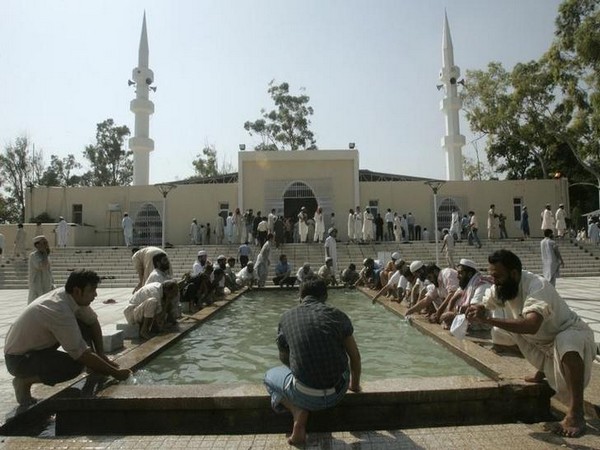The siege of Pakistan's Lal Masjid
Maulana Abdul Aziz, better known as 'Maulana Burqa' for escaping arrest in 2007, being disguised as a woman, does it again.

- Country:
- Italy
By Francesca Marino Maulana Abdul Aziz, better known as 'Maulana Burqa' for escaping arrest in 2007, being disguised as a woman, does it again.
Despite being banned by the government from entering the premises of Islamabad mosque, also known as 'Lal Masjid' for the colour of its walls, and being considered by a wide majority little more than a terrorist, the Maulana does it again and of course wins because, instead of being jailed, he has been allotted by the public administration 20 kanals of public land to build a new Jamia Hafsa, the female madrasa adjacent to the mosque. The dispute between the Islamabad Public Administration and the Lal Masjid has been going on for a couple of years, but whoever thinks it is only a land dispute would be totally wrong.
The mosque, and the madrasas linked to it, were managed until 2007 by two maulanas: Abdul Aziz and Abdul Rashid Ghazi. The two brothers were actually two former government officials, who were fired for illegally possessing firearms, being open supporters of the Taliban, of the Islamic strict observance law, and detractors of the then president Musharraf and his foreign policy. At that time, they had kept the government in check for months, threatening to send their followers to commit suicide attacks across the country. Incidentally, the government-financed and still continues to finance the mosque with public money.
The female madrasa of Lal Masjid is called Jamia Hafsa and was managed by Abdul Aziz's wife. Its girls, about two thousand black maidens dressed and armed with sticks and Kalashnikovs, had at the time kept the police in check to prevent the demolition of an old city mosque, and had particularly distinguished themselves in typically female activities such as trying to shut down shops selling movies and music destroying CDs, tapes and VHS, beating men and women who wore western clothes and even the unfortunate drivers, who insisted on driving their cars in person. In 2007, Musharraf commanded an anti-terrorism operation against the mosque, besieged for days by the Army. The operation costed the lives of an unknown number of people, marked one of the darkest pages of the former General's presidency and is still considered one of the main reasons for his fall.
Abdul Aziz, who escaped wearing a burqa and then arrested, was released in 2009. Since then he is free, free to continue his 'religious activities' in Islamabad and surrounding areas. Free to support and train jihadi, propagate sectarian and racial hatred. An open supporter of IS, he is the only one who has refused to publicly condemn the Peshawar massacre in which 130 children were killed. This time, claiming that the present government is as bad as the Musharraf's one, he did it again. Using female students once more to occupy the place. The Army besieged the location but apparently after Burqa obtained to discuss the issue with prominent people in the public administration, the girls started to leave while he 'promised' to leave by tomorrow.
A success for Islamabad authorities? Not really. Being in fact blackmailed by terrorists and their supporters is a new normal in the country. A few days before Maulana Aziz entered the Lal Masjid. In fact, the former TTP spokesperson Ehsanullah Ehsan had escaped from the safe house where the Army and ISI were keeping him with his wife and children. From Turkey, where apparently he escaped, Ehsan released a statement in which he talks of a deal struck with the Army and blames the authorities because they did not keep their word: the promised money had not arrived, so he simply left. Most probably with the connivance of the same people who were supposed to guard him.
The past week has seen the country open its doors for Ehsanullah, allowing the Taliban to demonstrate for freedom of Kashmir in the streets, having a deal with a terrorist for land reasons. At the same time, the Army has also been cracking down on peaceful demonstrators who demand their constitutional rights and PTM members being arrested for no reason. The Loralai location in Balochistan, where PTM was to commemorate the killing of the poet Arman Loni by the Army, has been flooded with water, internet been blocked and PTM members have been stopped from entering the region.
With no results, because thousands of people joined the demonstrations in Loralai and Karachi. But showing again the real face of Imran Khan's 'Naya' Pakistan: ordinary citizens and their demands are worth less than nothing, while terrorists are allowed money, freedom and bargaining power. (Disclaimer: The views expressed in this column are strictly those of the author) (ANI)
(This story has not been edited by Devdiscourse staff and is auto-generated from a syndicated feed.)
ALSO READ
Protest in Balochistan Marks Six Years of Rashid Hussain's Disappearance
Tensions Mount: Taliban Retaliates Against Pakistan Amid Border Dispute
Tensions Flare: Afghan Taliban's Retaliatory Strikes Near Disputed Durand Line
UN Condemns Deadly Airstrike in Afghanistan: Civilians Caught in Pakistan-Taliban Crossfire
Cross-Border Tensions: Afghan Taliban Strike Back










